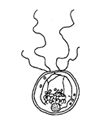Chrysodidymus
REPRODUCTION AND LIFE HISTORY
Chrysodidymus cells reproduce asexually by binary fission, with
mitotic division of the nucleus.

|
Cells about to divide normally separate from each
other. Occasionally a dividing cell remains temporarily
attached to its partner, leading to a transiently three-celled
colony. New flagella appear prior to cell division and migrate to their
positions in the resulting two-celled colony.
|

|
The mitotic spindle consists of two cones of microtubules, each of
which is attached to small plaques that may be, or be derived from, the
rhizoplast that emanates from each basal body pair during interphase.
At metaphase, the nuclear envelope is visible only on the posterior
side of the nucleus
(the spindle is "partially open"), nor is the nucleolus visible.
The known features of mitosis are consistent with what has been observed
in other "synurophyte" golden algae.
|
No sexual reproduction has been observed.
Return to summary information
